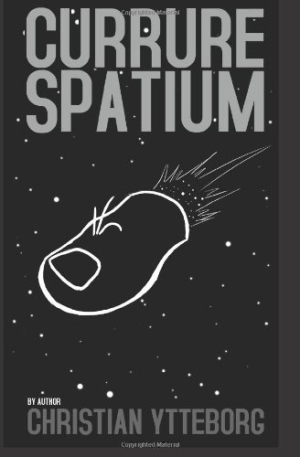Currure Spatium
With jaunty and engaging moments, Currure Spatium is a well-mapped commentary on an undesirable potential future.
Christian Ytteborg’s tongue-in-cheek debut novel, Currure Spatium, presents a future universe in which a rogue, flying toe can disrupt all.
The lone survivor from the crash of Chuck’s Belly, an environmentally concerned exploratory spaceship, is Al Gore’s toe. Or rather, a copy of it: this digit belonged to a wealthy Al Gore admirer who adopted the former VP’s face and name as his own. Containing a computer chip that may hold a map to infinite sources of power, the toe is hurtling back toward Earth—and toward a bevy of greedy capitalists eager to exploit its secrets.
Among the least unscrupulous of those on its trail are Billy Bob “B.B” Art, the commander of a for-hire ship, and Lara Baywatch Craft, a buxom reporter hoping to intercept a story. Accompanied by a knowledge-thirsty robot, they’re tailing Earth’s two competing retrieval ships, each piloted by a bombastic, bumbling, and famous personality. All are in unknowing competition with the twisted leader of an oil corporation, the Emperor Gaius Julius.
News stories that help to illuminate this busy future universe punctuate the story, but the bulk of it rests on B.B and Lara. They prove to be sometimes dubious protagonists, more or less moral creatures who are occasionally derailed by streaks of hubris. Some such moments, as with B.B’s inglorious fight with a mouthy fish on an aquatic planet, provide moments of levity, if they otherwise fail to move the story along.
Ytteborg’s universe is broad and riddled with the amplified problems of the twenty-first century, frequently giving the novel the feel of a satire. Both capitalism and liberalism have become garish and bloated in this future, resulting in a politically absurd Earth populated by frequently vapid personalities, the worst of whom are bound to make it to the top.
Though these points are sometimes heavy-handedly made—a scene in which Lara sits with her suggestive boss is overwhelmed by the repetitious use of the word “penis”—they also succeed in making the reader consider what the future might look like if humanity’s worst impulses were to remain unchecked.
Sometimes the linguistic choices impede the natural humor of the work. Points tend to be overaccentuated, as when the reader learns of the planet Found Atlantis: “It was similar to planet Earth in many ways except it was completely covered in water and therefore maybe quite different instead.” Dialogue set in full caps becomes exhausting, and repetition has a saturating effect.
Barbs traded between characters are often humorous, though it’s not always certain that they are intentionally so. Mistakes with tenses and dates aren’t uncommon, with the original Gore placed in the nineteenth century throughout.
The work is strongest where the concepts are least forcefully emphasized, and the novel has its jaunty and engaging moments. The underlying condemnation of indulged vices remains strong throughout. Currure Spatium is a well-mapped, if sometimes overdone, commentary on an undesirable potential future.
Reviewed by
Michelle Anne Schingler
Disclosure: This article is not an endorsement, but a review. The publisher of this book provided free copies of the book and paid a small fee to have their book reviewed by a professional reviewer. Foreword Reviews and Clarion Reviews make no guarantee that the publisher will receive a positive review. Foreword Magazine, Inc. is disclosing this in accordance with the Federal Trade Commission’s 16 CFR, Part 255.

